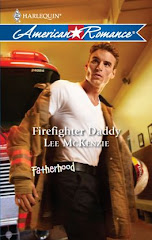In case anyone’s wondering where I’ve been, please check out my October 24th post on the Harlequin American Romance Authors’ blog.
I’ve been wanting to blog about Men in Trees, now that it’s finally back for a second season, but I also wanted to do it justice.
Of all the shows on TV right now, Men in Trees is probably the closest to a Harlequin American Romance, the line I write for. These books are about home and family and community, and people falling in love and overcoming their differences. Personally I love character-driven stories, and MiT is all about the characters. Even the setting, the fictional town of Elmo, Alaska, is as much a character in the story as it is a setting.
The show has an extensive cast of characters, each with his or her own story arc. Well, all except Jerome, the perennial stool-warmer in the local bar, but we love him anyway.
One of my favorite writing how-to books is The Complete Guide to Heroes & Heroines: Sixteen Master Archetypes by Tami D. Cowden, Caro LaFever and Sue Viders. This book was primarily written for romance novelists, but the archetypes themselves apply to all genres.
I’d hazard a guess that Jenny Bicks—creator of Men in Trees—hasn’t read this book, but because she’s a natural-born storyteller, creating strong archetypes comes as naturally to her as breathing. Take Jack and Marin. He’s a classic professor. His character strengths? He’s an expert at what he does, he’s analytical and he’s genuine to the point of being vulnerable. Of course, no one’s perfect, and Jack does have his flaws. He can be insular, a little inhibited, and not all that flexible. These are not my descriptions, BTW. They’re from the book.
Marin is a librarian archetype. This character “lives in her head.” She’s every bit as analytical as the professor, but in the case of Jack and Marin, they’re often analyzing different things, or approaching the same thing from a very different perspective. The librarian is efficient, she takes life seriously, and she’s dependable. There’s nothing she won’t do for friends. Also, she’s a can be a tad on the stubborn side, every bit as repressed as the professor, and if she’s going to do something, it has to be perfect.
What happens when we put the two together? Cowden et al say, “The professor and the librarian are both accustomed to others coming to them for information.” Hammer, meet nail. And “...neither takes kindly to being questioned, regardless of who is doing the questioning.”
Men in Trees is a textbook example of how to create characters, and how to make them work.
I think some writers have a difficult time distinguishing between archetypes and stereotypes, and again Jenny Bicks and her writers show us the difference.
Marin’s friend Jane is also a librarian. Each struggles to maintain order in her world, but are they cookie-cutter characters? Not at all. Cowden et at describe two types of librarians—the know-it-all and the bookworm—and anyone who watches MiT will have no trouble deciding which is which!
I can already hear some of you saying but . . . every character wants order in his or her world. Not quite. Look at Mai Washington, Buzz’s adorable mailorder bride. She’s a free spirit archetype who goes with the flow. Her world already has an order to it, and it’s out of her control. Does she fight it? No, but she’ll definitely come up with creative ways to work around it.
Men in Trees is on again tomorrow night. I’ve heard, but haven’t confirmed, that next Friday, November 2, the show is moving to a different time slot. Watch those listings, because I’m sure it’ll be a show we won’t want to miss!
Till tomorrow,
Lee
Subscribe to:
Post Comments (Atom)





2 comments:
Love the way you show us what Jenny and crew are doing with Men in Trees!
I watch the show for the pure fun of it, so it's great that someone out there (that would be you, Lee) is paying attention to the underpinnings and giving us a good reason/rationale/excuse to save that time slot every Friday night. We can tell our families that we're keeping the remote control, thank you. It's research!
You're right, Rachel. It is research, and I say that in all seriousness. Good storytelling is good storytelling, so yes, hold onto that remote!
Post a Comment